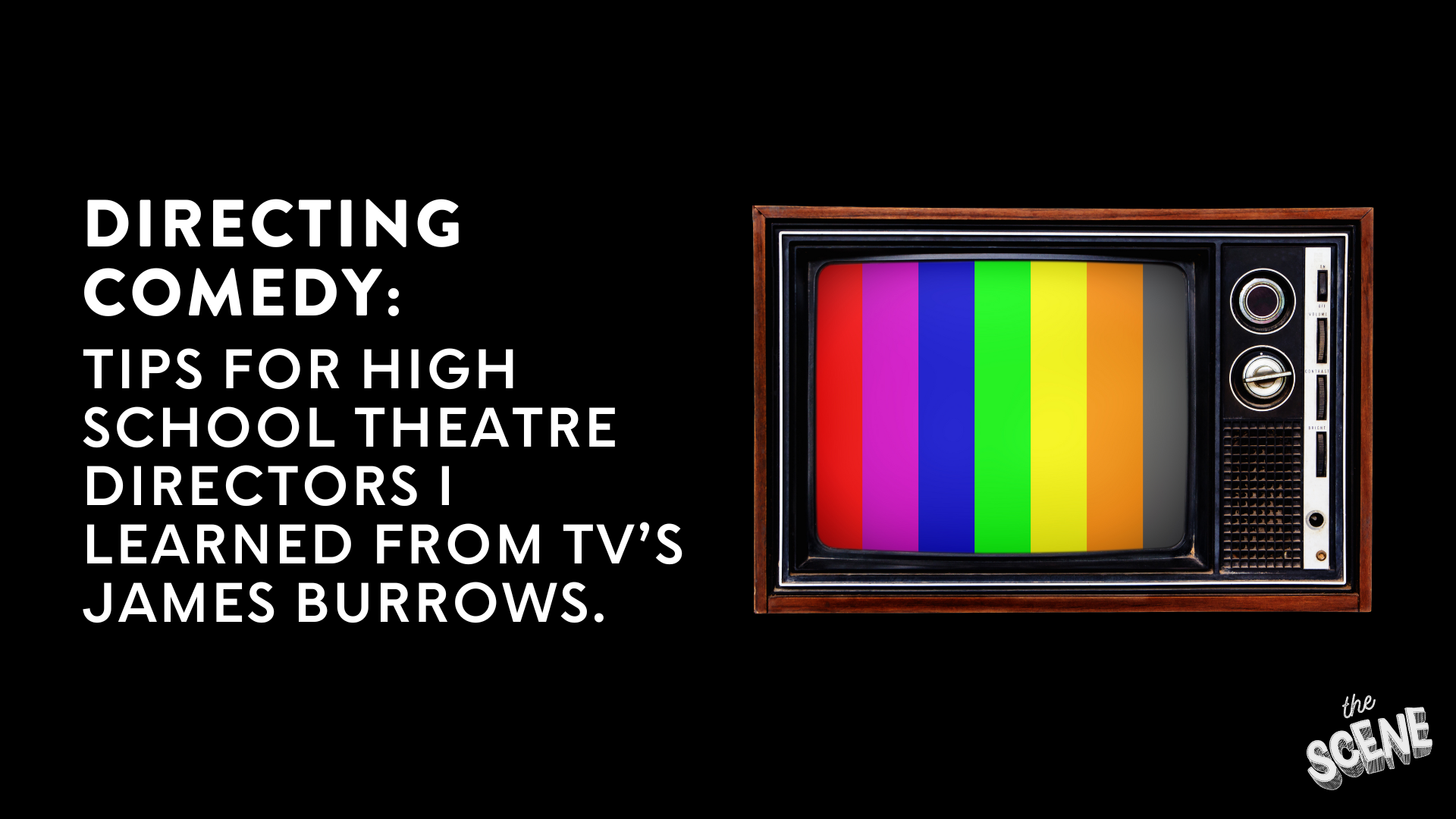By Zach Dulli, The Scene
Directing high school theatre can feel like a Herculean task, especially when it comes to directing comedy. Guiding seasoned actors in delivering punchlines with finesse is one thing, but getting a group of teenagers to understand comedic timing and the truth behind the humor is a whole different challenge. Yet, if one person has mastered the art of transforming scripts into genuine laughter, it’s the legendary television director James Burrows. For those who may not know, Burrows is the creative mastermind behind some of the most iconic TV shows ever, including Taxi, Cheers, Frasier, Friends, Will & Grace, and many more. He’s a Yale School of Drama graduate and the son of Abe Burrows, the celebrated librettist behind ‘Guys and Dolls’ and ‘How to Succeed in Business Without Really Trying.’
Years ago, I had the privilege of shadowing Burrows on the short-lived CBS series ‘The Class.’ The experience was transformative, and the lessons I learned from this 47-time Emmy nominee about directing comedy have stayed with me ever since. Here are some invaluable tips from Burrows himself that will help bring out the best in your next high school comedy production.
Find the Truth in Every Scene
During rehearsals, Burrows often quietly leaned over and asked me, “Hey Zach, Did you believe it?” He wasn’t concerned with whether the scene was funny yet; he focused on believability. If a moment felt contrived or forced, he’d intervene, guiding the actors to find the honest truth in the scene. This is the bedrock of good comedy: an unshakeable commitment to the truth of the moment, no matter how absurd the situation might be.
For high school directors, this means moving beyond the surface of the script. Teach your students to ask themselves if their characters’ actions and reactions feel real, even in a heightened comedic context. Encourage them to dig deeper into their characters’ motivations. Why is this moment happening? What does the character want? Once they understand that, the comedy will emerge naturally.
It’s All About Rhythm
At times during filming, I would see Burrows with his eyes closed, listening intently to the rhythm of the dialogue. Comedy is a symphony of words, beats, and pauses. In high school theatre, students may rush through lines or stretch them out too long, losing the inherent rhythm that makes comedy sing. As a director, your job is to become a conductor of sorts, helping your young actors find that sweet spot where timing and delivery converge to create laughter.
During rehearsals, try an exercise: have your students close their eyes and just listen to the scene being read aloud. Let them feel the rhythm, the ebb and flow of conversation. Then, have them perform it again, this time with their eyes open, trying to maintain that same sense of musicality in their delivery.
Be a Director, Not a Traffic Cop
Burrows didn’t like directors who acted like traffic cops. In other words, don’t just focus on blocking and movement. Instead, get your actors up and running the scene as soon as possible. After the first read-through, let them explore. Let them try new things. High school actors often need to get out of their heads and into their bodies to truly discover the comedy within the scene.
Encourage improvisation and experimentation—yes, even when rehearsing a scripted comedy. It’s in these spontaneous moments that some of the best comedic gems are found. Be open to new ideas and foster an environment where your students feel safe to say, “What if we tried it this way?” This is how Burrows created a supportive, collaborative atmosphere on set, and it’s just as crucial in a high school theatre setting.
Create Multiple Options Before Locking in Choices
Before locking down a scene, Burrows would work with the actors to create multiple options. This approach is invaluable, especially when working with young actors who might not yet have the experience to know what works best. Run the scene in different ways: try it fast, slow, big, small. Explore every possibility. Then, collectively decide which version feels the most truthful and funny.
This method not only enhances the final performance but also empowers students. It gives them ownership of the creative process, making them feel like contributors rather than mere executors of your vision. And when they feel invested, they’ll take greater risks, leading to richer, more authentic comedy.
Foster a Supportive Environment
One of the most remarkable things about Burrows’ work on The Class was the camaraderie among the cast. Despite being a relatively new ensemble, they supported each other, contributing ideas and sharing in the creative process. This atmosphere was no accident; it was cultivated by Burrows’ calm leadership style, which valued every voice, nurtured collaboration, and didn’t waste anyone’s time.
In high school theatre, creating a supportive, calm, inclusive environment is key. Encourage your students to listen to each other’s ideas, to offer constructive feedback, and to celebrate each other’s successes. This kind of environment not only makes the rehearsal process more enjoyable but also translates into a more cohesive and compelling performance.
The Economy of Comedy
When directing high school comedy, focus on the economy of the humor. Ask yourself: what’s the shortest distance between the character and the laughter? Sometimes, a line or a moment can be funny on its own, but if it’s surrounded by unnecessary fluff, that dilutes its impact. Don’t be afraid to tighten moments that don’t serve the scene. It’s not about getting through the play faster but making every second count.
In the End, It’s All Theatre
“What I do is theater,” Burrows said. “Theater that I film for television.” This sentiment holds a powerful truth for high school directors. Whether your stage is a multi-million-dollar television soundstage or a modest high school auditorium, the principles are the same. It’s about connecting with the audience through the authenticity of the performance. It’s about guiding your actors to find the truth, embrace the rhythm, and trust in the collaborative process.
So, as you embark on your next high school production, remember the wisdom of Jim Burrows. Don’t just direct your students; inspire them to discover the truth in every moment, to play with courage and curiosity, and to find the laughter that comes from a place of genuine connection. After all, that makes comedy—and theatre—genuinely unforgettable.









